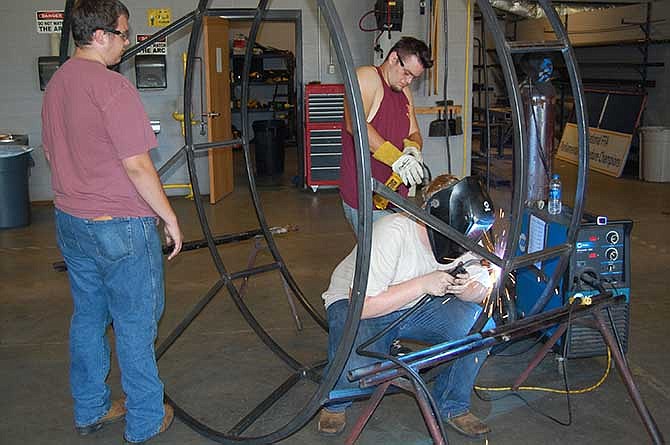Two Missouri House of Representatives bills sponsored by Lake of the Ozarks area State Rep. David Wood, R-Versailles, could change the way school districts look at certain career and technical programs, as well as what benefits students can earn through the A+ Scholarship.
House Bill (HB) 1247, co-sponsored by Wood's fellow Lake area State Rep. Rocky Miller, R-Tuscumbia, would amend the state's current A+ Scholarship Program to allow qualifying students who use the program to attend a participating two-year community college or vocational/technical school to be reimbursed for tuition costs they paid for dual-credit courses in high school that would have been part of their post-secondary program.
A student's reimbursement would be credited to his or her account at the higher-education college or technical school.
"That money can then be used to pay for books, lab fees and other things that used to be covered by the A+ program but now are not," Wood said.
Any unused reimbursement would be returned to the state treasury after the student's graduation.
Dual-credit courses allow students to earn college credit by taking certain advanced courses during high school. However, they receive the college credit only if they pay the often-discounted tuition fee to the partnering higher-education institution.
Eldon R-1 School District Superintendent Matt Davis testified on behalf of the bill during its public hearing Jan. 29.
"We have about 50 students that will take dual-credit classes. Some of those seniors choose not to pay for it," Davis said. "I think if this bill was passed, maybe those students would realize they could pay for it in high school and then put that money toward textbooks and other school-related costs."
Last school year, 18 Eldon High School seniors participating in the A+ Scholarship Program enrolled in a two-year community college after graduation, but only five of them paid for dual-credit courses during high school. The other 13 waited to take those courses in college when their A+ funds would go toward the tuition.
"If you have 12 college credits when you graduate high school, you are 60 percent more likely to complete your program," Davis said, noting the dual-credit reimbursement might help students get off on the right foot.
"I think it's a good start. I think it's a great incentive to get kids to pay for the dual-credit courses in high school," he said.
A second education-related bill, HB 1189 would require the Missouri Department of Elementary and Secondary Education to develop a high school graduation policy that would allow students to fulfill one unit of academic credit in each of the four core subject areas - communication arts, mathematics, science and social studies - with a district-approved agriculture or technical course.
This would be in addition to the current optional waiver that allows students to apply three units of career and technical course work to one unit of academic credit.
The change would encourage students interested in agriculture and other career and technical work to focus more of their efforts there.
"One of my beliefs is that we have pushed our required courses for high school graduation more to a college-preparatory certificate and really, for some of the kids who need a vocational or tech school, made it more difficult for them in requiring them to take classes they don't really need," Wood said.
"History has shown that 25 percent of high school graduates go to college. The other 75 percent go to community colleges, tech schools or straight to work. We need to be providing something for that 75 percent as well as those that want to go to college, and this will help do that."
Allowing students to meet certain graduation requirements with these courses would be a step toward giving them the same level of encouragement as the college-bound, he continued.
"Not everybody needs a college diploma, and not everybody should get a college diploma," Wood said. "There's a lot of honor in a good job and an honest day's work ... If we tell all of our high school graduates they're not going to be a success unless they get a college degree, why would you feel encouraged to be a plumber?"
The opportunities are there locally for high school students interested in agricultural and technical fields. Both the Eldon Career Center and the Camdenton R-3 School District's Lake Career and Technical Center (LCTC) offer programs in agriculture, computer technology, construction and building trades, graphics technology, health occupations and transportation. In addition, LCTC, which is also open to students in the School of the Osage district, offers culinary arts, law enforcement, metal fabrication and pre-teacher education programs; and the Eldon Career Center, which serves students from the Eldon R-1, Cole County R-V (Eugene), Morgan County R-1 (Stover), Morgan County R-2, Miller County R-3 (Tuscumbia) and St. Elizabeth R-IV districts, also offers business, marketing and digital media programs.
Some LCTC courses already offer embedded academic credit for communication arts, technical math, technical science and fine arts.
"I don't believe in watering things down for students, and I don't believe in making it easier. I do believe that students do need a comprehensive high school education, but I also know for some students taking a relevant career education class is probably more beneficial than taking an algebra II class," Davis said.
"Let's say a kid takes Building Trades," he continued. "He's using the math he needs to understand to build a house."
The school district could consider making the Building Trades course count as a third math credit after algebra 1 and geometry, should the bill pass. Other examples might include substituting the Greenhouse Operation & Management course for a science credit, a drafting course for a math credit, or a marketing or economics course for a social studies credit, Davis said.
HB 1189 is scheduled to be heard by the Missouri House of Representatives on Feb. 12.
Wood is sponsoring three additional education-related bills this legislative session, as well as co-sponsoring 22 other bills.

